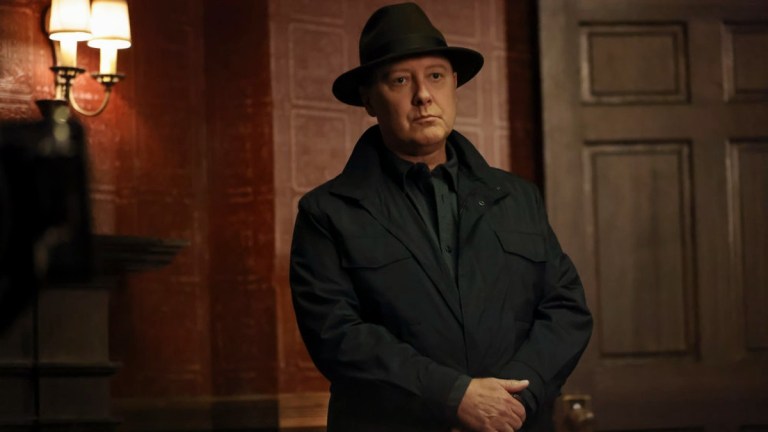The Blacklist: What is Red’s Endgame?
What will Red's fate be on the Blacklist? The answer lies in the past.

This article contains spoilers for The Blacklist through season 9.
Two questions that define Raymond “Red” Reddington (James Spader) on The Blacklist are “how far is he willing to go?” and “why does he do what does?” The genius of Red as both sinner and saint creates a character that is certainly akin to a normal human being, though larger-than-life. But that doesn’t mean Red’s endgame is larger-than-life as well. His endgame may be a reward that is utterly and undeniably just normal.
It may be normal, but it will inevitably have a Red spin to it that will surprise and inspire. The metaphysical, the Hobson’s choices, and season nine’s “Avenging Angel” as well as the death of Marvin Gerard demonstrate three themes in The Blacklist that can help fans come to understand Red’s endgame through the endings he gives to others.
The Importance of Sea Breakers Inne
Since we’re talking about Red’s very existence, causality, and truth here, it’s important to track back to the first (and only?) metaphysical insight fans received over the show’s nine seasons. In season 3 episode 19, “Cape May,” we are given our first installment of the series that isn’t focused on a blacklister. Instead, we are taken to a location powerful enough to conjure up some of Red’s most crucial memories and to force him to relive his experiences at Cape May, NJ.
The first clue that these memories-folded-over-memories are worth decoding is in the name of the physical location Red both seeks out and is then overwhelmed by: Sea Breakers Inne. On the sign out in front of the picturesque, oceanside hotel, which is closed for the season, the use of the term “inne” to describe the location is critically important although likely unnoticed by most viewers. Nowhere on the planet is a hotel referred to as an “inne.” An “Inn” certainly, but the usage of “inne,” in any context in modern English, is obsolete.
Tracing the origins of the word “inne” is difficult and elusive. The clearest example is from Old Irish-English and refers to one’s anatomy, specifically the bowels, guts, or viscera. In the spiritual sense, “inne” may also refer to one’s center, intrinsic feelings, essence or nature. And so it happens that Katarina Rostova (re)enters Red’s reality as he visits Sea Breakers Inne. It is the memory of the day in 1991 when she walked into the sea, supposedly to her death, although we know now, at the end of season nine, that Katarina Rostova is still alive.
Red had just arrived in Cape May and seemed quite familiar with Sea Breakers Inne. He breached the locked entry easily and snaked his way through passageways and porticos until he arrived at a nondescript door that led into a storage shed. There he picked up a chair, walked through the shack to the other end, and opened a door that emptied out onto the sand and a pristine view of the coastline. The water was breaking in roughly as the waves neared the shore. The beach was desolate, save for an elderly man pushing his metal detector over the sand about two hundred yards away. Red set up his chair and seemed to relax as he took in the view.
He didn’t get to relax for long as he noticed a crimson-haired woman kneeling in the sand. She removed her jacket and then her necklace before standing and walking toward the water. She kept going when the cold waves slapped her shins. Then she dove in, without a moment’s hesitation. Red also didn’t hesitate to chase her and throw himself into the rough, icy water with the gusto of a martyr. He carried her out of the water and laid her down on the sand. She coughed and sobbed all at once, and he placed his hat under her head. When she got all the water out of her lungs, he picked her slight frame up again and carried her toward the hotel.
Once they get inside, dry off and rest a bit, they begin talking and this is where we learn of Red’s broken heart. He speaks of a woman he loved who died and a child that he tried to save but didn’t…or couldn’t. Perhaps Red is talking about Katarina, Elizabeth, and Agnes. Maybe he is remembering his former life, before he took the name Raymond Reddington, and a woman and child whom he loved but also met a miserable fate. And what does Red mean by referring to all of this as a “Hobson’s Choice?”
The Hobson’s Choices
The phrase “Hobson’s Choice” originated in the 16th century and is named after Thomas Hobson, a licensed carrier of messages between Cambridge and London, England. When his horses weren’t being used for deliveries, he would rent them out to students from the university. Because those horse lovers preferred specific mounts, Hobson found his best horses were being overtaxed and so he devised a solution. The first stall with a horse occupying it was the one that was up for lease, no more free choice for the joy-riders. It became part of common speech, then, to refer to having no real choice at all as a Hobson’s Choice.
It’s important to remember that Tom was the father and husband of the mother and baby in jeopardy in the episode that preceded Cape May, so Red was truly just a bystander in the events that led to Elizabeth’s (faked) death. It wasn’t up to Red to save Elizabeth or Agnes. At Sea Breakers Inne, Katarina says that Red “had no choice. It was me or Masha (Elizabeth).” A truly confounding statement since, at the time, both women were still living. Although it is Elizabeth’s life that Red has inserted himself into while Katarina’s whereabouts remain elusive.
Another big question fans have grappled with is whether Red was Elizabeth’s father. Sea Breakers Inne can also help us decode this problem. It’s 1991, Elizabeth is being cared for by others (Mr. Kaplan and eventually Sam), Katarina’s presence in Elizabeth’s life means death for her daughter, and Red is about to assume another man’s identity in order to grapple with these questions himself. Paternity testing beyond shared blood type was not readily available and didn’t have an exclusion rate of 99.99% until well into the 1990s. Even then, it wasn’t like a test could be picked up at the local drug store. Red likely had no way of knowing for certain if he was Elizabeth’s father until she was well into elementary school. By then, he was a father to her in his heart, whatever their blood had to say about it.
An additional Hobson’s Choice that we see Red deal with in Cape May is the decision to stay and fight off the men who are coming to kill Katarina. Red stays and fights even though Katarina encourages him to leave. Why would Katarina not want the clever, proactive, brutal Red we know to stay with her? Clearly, at the time this memory was actually taking place, Red was not the man we know. In fact, he learned from Katarina. As we watch the traps get laid and the bodies fall in “Cape May,” it’s Katarina who is clever, proactive, and brutal. Red followed Katarina’s instructions to the letter, and, for a rookie, his instincts were sharp. But Katarina saved Red’s life at least twice that night.
The “inne” of the matter, the heart and soul of Raymond Reddington, is the lack of real choice. There is only the current of life and where it leads, and Red becomes a master at succeeding in life…and staying alive. But life is not his endgame…it is the opposite: death. What greater Hobson’s Choice do we all have than this inevitability? For this same reason, Marvin is given the chance to fall on his own sword rather than be gunned down like a dog. For each of us, it’s not if we will die one day…but how.
The Avenging Angel and Marvin Gerard
At the beginning of season nine, Red was choosing to live out his days in peace at Mierce’s and Weecha’s monastery. But in true Godfather fashion, he got pulled back in! Pulled back into the criminal world, to the FBI, to revenge and to staying one step ahead of disaster. While “Cape May” shows Red learning how to live in a new, unexpected reality, season nine has shown that Red’s endgame is the ultimate endgame. How is Red different from Micheal in the “Avenging Angel” in season 9 episode 4? She judged and murdered based on a person’s worst day, and Red judges and murders based on “every other day” in a person’s life.
But what about Marvin Gerard’s (Fisher Stevens) revelation at the end of season nine that he and Red built their criminal empire in order to save the world from the worst of the worst? As Red and Marvin discuss this over the gun that Red has pointed at Marvin in the judge’s office, Marvin even says that this was the altruistic reason that they became criminals at all. All of Marvin’s speech is reminiscent of a start-up structuring their business plan around a well-developed mission statement. Likely, it’s more indicative of a man facing death who is trying to rationalize his own actions rather than provide any real insight into Red’s life choices.
Red has not lived a righteous life, but he does choose righteous death for others…and, one day, he will choose the same for himself.
